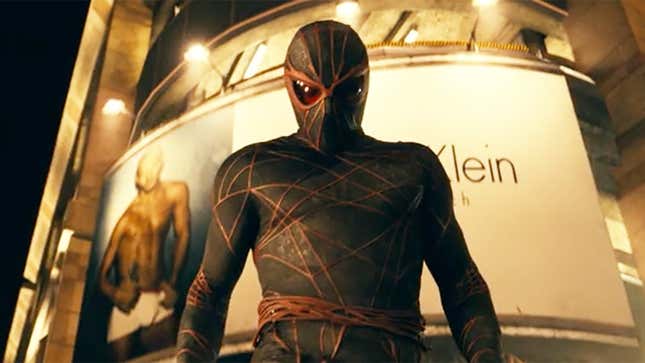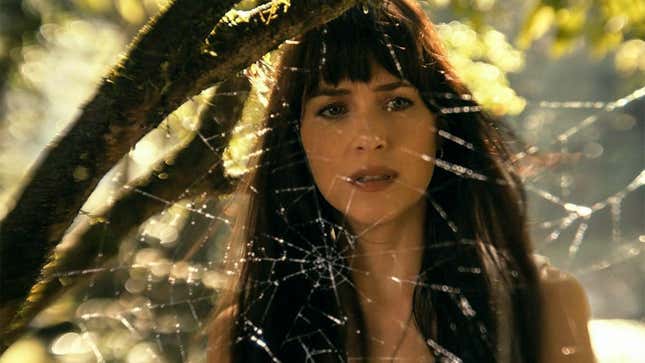ARTICLE AD
You may have heard that Madame Web is not a good movie. That there are, in fact, things about Madame Web that could be described as “The Worst.” I am not here to refute those claims; there are in fact many things about Madame Web that are not what you would feasibly call “good.” But in its surprise camp turn, it embraces its period setting to deliver a potent reminder on how far superhero movies have come, and what they’ve lost along the way.
Doctor Strange 2's Sam Raimi on America Chavez
Madame Web jukes where the standards of the contemporary superhero movie have jived in many, many ways. Whereas now a superhero film is unafraid to throw a name like Kang the Conqueror or Darkseid at you, Madame Web calls its villain—Tahar Rahim’s Ezekiel Sims, a stalking, obsessive serial killer whose dialogue is seemingly delivered almost entirely through ADR voiceover—“crawling guy.” A contemporary superhero movie is perhaps more often than not these days about climaxing in a massive punchdown VFX brawl, with a portal or some kind of giant beam of light in the sky for good measure, while Madame Web is a teen slasher movie where the slasher just happens to look like Spider-Man. Today, on-screen superpowers are flashy and eclectic; in Madame Web, the titular heroes’ burgeoning precognitive abilities feel more like a mix of generally supernatural vibes and a questionable South American spiritual journey. Where modern superhero movies have fully embraced (albeit, in an over-designed push to realism, in a more muted way) the myriad costumes of the comics source material, Madame Web doesn’t really want any of that at all, making only a fleeting acquiescence to the need for Spandex.

Image: Sony Pictures
All this is to say that Madame Web is both a movie set in 2003—which it goes to goes to great lengths to remind you of via, of course, an action set piece set to Britney Spears’ “Toxic,” which itself is repeatedly referred to in said sequence as a hot new track—and also a movie that is about what superhero movies were in 2003. Post X-Men and the first of Sam Raimi’s Spider-Man films, contemporary to Daredevil and shortly thereafter Catwoman, Madame Web finds much more in common with those movies than it does the contemporary superhero blockbuster at the apex of their mainstream popularity. To go back even a little earlier than that, there’s something of a spiritual connection between Madame Web and Joel Schumacher’s Batman & Robin, itself a movie that in some point in the superhero movie evolutionary cycle was believed to have laid the genre low. If Batman & Robin’s perceived (and now blessedly re-evaluated) sins were in its camp excess, from garish colors to benippled batsuits, then Madame Web’s own are in a camp reservation, an almost silly unwillingness to be what we expect of a modern superhero movie to instead unabashedly, and frequently bizarrely, do its own thing.
There’s something as frequently charming about that gumption, too. In embracing its setting, Madame Web embraces a time when superhero movies were still trying to navigate this whole comic book thing, as if there’s a limitation there that breeds many attempts at creativity, even if not all of them pan out. The aforementioned idea of treating a movie around the origin story of the character of Madame Web—in the comics a decrepit old blind woman with future visions mostly known for sitting in a chair and yelling at Spider-Man—as instead a slasher about protecting the futures of three young women destined to join the Spider-Verse is far more compelling than anything even remotely faithful to the comics material could’ve been, even if the execution occasionally leaves much to be desired. The embrace of Dakota Johnson’s Cassie Webb as a distinctly awkward, off-putting loner who eschews social gatherings and connection is a far cry from the charismatic superhero leads we’ve come to expect, made even more weirdly delightful by the fact her seeming power in this movie is the ability to steal, and then crash into people, many cars, as much as it is precognition. Madame Web feels like a throwback to a time superhero movies had thought they’d grown beyond, and everything that entails.

Image: Sony Pictures
And yet, this time capsule to an era almost firmly in the medium’s review mirror—and into a world where mainstream audiences can rattle off members of the Guardians of the Galaxy like cinematic household names, or Colin Farrell can star in a gritty streaming series about the Penguin—lands at a fascinating moment for these kinds of movies, with the thud of Cassie Webb plummeting from a neon Pepsi sign into the East River. Superhero fatigue is no longer a term murmured online in fandom circles; it is a real specter that threatens to haunt a movie industry that has spent the best part of the last 15 years retooling their focuses to tap into this titanic boom. Warner Bros is preparing to completely overhaul its superhero slate after a string of disappointments undid its last shared universe, Marvel is anxiously eyeing its future again and again after a spate of throwing down too much, too soon after the climax of its vaunted “Infinity Saga.” And then there’s Sony, vacillating wildly between giddy critical acclaim with its Spider-Verse movies and, well, Madame Web.
Madame Web releasing amid this tumult about the declining age of the superhero movie—itself trying to launch a franchise out of a franchise of films loosely connected to another franchise—and being this schlocky throwback to what superhero movies used to be before that boom is fascinating. Fascinating in ways that work, like its willingness to play with genre beyond the CG-action spectacle the genre has become—and fascinating in ways that don’t, from its clunky avoidance of the source material to, yes, its frequently unhinged dialogue and performance choices. Perhaps in the context of now, Madame Web is not the best superhero movie, because what superhero movies have become has changed what that particular standard is. But there was a time when it would’ve been delightful beyond its camp charms—and for its willingness to go there, warts and all, it’s a time I gladly visit over a lot of its supposedly superior superheroic contemporaries.
Want more io9 news? Check out when to expect the latest Marvel, Star Wars, and Star Trek releases, what’s next for the DC Universe on film and TV, and everything you need to know about the future of Doctor Who.

 1 year ago
85
1 year ago
85 

